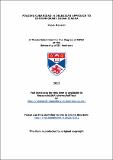Files in this item
Folding cubanidad : a Deleuzian approach to contemporary Cuban cinema
Item metadata
| dc.contributor.advisor | Martin-Jones, David | |
| dc.contributor.author | Monaldi, Paola | |
| dc.coverage.spatial | 108 | en_US |
| dc.date.accessioned | 2013-01-09T12:35:05Z | |
| dc.date.available | 2013-01-09T12:35:05Z | |
| dc.date.issued | 2012-11-30 | |
| dc.identifier.uri | https://hdl.handle.net/10023/3322 | |
| dc.description | Electronic version excludes material for which permission has not been granted by the rights holder. Copyright permissions are pending. | en_US |
| dc.description.abstract | In this thesis I look at the way in which Cuban cinema of the post-Cold War period re-envisions the image of the nation through a theoretical framework of Deleuzian extraction. In particular, I refer to Deleuze's philosophy of difference and multiplicity to explain how national difference can be produced by film narratives operating within given ideological boundaries, and national identity differentiated within a broader, socialist idea of society. A review of recent Cuban cinema reveals the emergence of intensive and crystalline regimes of narration in both fiction and documentary cinema. Chapters one and two will therefore examine the shift of Cuban fiction cinema towards forms of time-image (metanarrative and magical realism); chapter three will consider the affective turn of the new Cuban documentary. In both cases, the inclination of Cuban cinema towards affection- and time-image will appear motivated by a national need for self-revision. In particular I will argue that, by raising intensities and virtualities, contemporary Cuban cinema acts as modern political cinema. While Cuba is rethinking itself and its position in the wider world, Cuban cinema is reimagining the nation in terms of becoming-minoritarian, that is, as a transformative and multifaceted entity in which national contradictions can be reconciled and similarities with the outside world can be more easily found. By bringing together Deleuze and Cuban cinema, this research aims to contribute to the studies on cinema and national identity through the case study of Cuba, and to the field of Deleuzian studies by presenting a new application of Deleuze’s philosophy in a socialist context. | en_US |
| dc.language.iso | en | en_US |
| dc.publisher | University of St Andrews | |
| dc.subject | Deleuze | en_US |
| dc.subject | Cuban cinema | en_US |
| dc.subject.lcc | PN1993.5C8M7 | |
| dc.subject.lcsh | Motion picture plays--History and criticism | en_US |
| dc.subject.lcsh | National characteristics, Cuban, in motion pictures | en_US |
| dc.subject.lcsh | Deleuze, Gilles, 1925-1995 | |
| dc.subject.lcsh | Cuba--In motion pictures | en_US |
| dc.subject.lcsh | Motion pictures--Cuba--History--20th century | en_US |
| dc.subject.lcsh | Socialism and motion pictures | en_US |
| dc.title | Folding cubanidad : a Deleuzian approach to contemporary Cuban cinema | en_US |
| dc.type | Thesis | en_US |
| dc.type.qualificationlevel | Doctoral | en_US |
| dc.type.qualificationname | MPhil Master of Philosophy | en_US |
| dc.publisher.institution | The University of St Andrews | en_US |
This item appears in the following Collection(s)
Items in the St Andrews Research Repository are protected by copyright, with all rights reserved, unless otherwise indicated.

